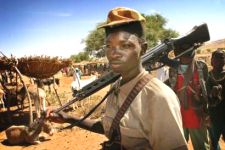African Union works to break Sudan rebel boycott of Darfur peace talks
By DULUE MBACHU, Associated Press Writer
ABUJA, Nigeria, Dec 14, 2004 (AP) — African Union mediators worked Tuesday to break a rebel boycott of talks to bring peace to Darfur, the western region of Sudan where fighting has created the world’s worst humanitarian crisis.

|
|
Sudan Liberation Army (SLA) rebels walk through an unidentified village in the desert west of El Fasher, the capital of North Darfur state, November 8, 2004. (Reuters). |
Rebels accused the government of a new offensive late Monday and said they wouldn’t meet with government negotiators until the violence ceased. There was no independent confirmation of the allegation.
Assane Ba, an African Union spokesman, said mediators met separately with the warring parties on Tuesday but hadn’t yet been able to bring the two sides together.
“We hope we’ll be able to reconvene,” he said.
Despite the impasse, rebels showed no sign they would abandon the negotiations in Abuja, capital of Nigeria.
The United Nations says the war in Sudan’s Darfur region has created the world’s worst humanitarian crisis. Tens of thousands have died and nearly 2 million have been driven from their homes in the nearly two years since the fighting began.
Representatives from Darfur’s two main rebel groups and Sudan’s government are attending the talks, which are expected to focus on reviewing interim agreements from during previous talks.
Ultimately they hope to come up with a power-sharing plan leading to disarmament.
Two newer, smaller insurgent groups are not represented at the talks in Nigeria, a regional powerhouse that currently heads of the 52-nation African Union.
Earlier talks produced a Nov. 9 accord on humanitarian access to the estimated 1.8 million war-displaced in Darfur and in neighboring Chad. They also brought new pledges of an end to hostilities – promises that were immediately violated.
Disease and famine caused by the fighting have killed 70,000 in Darfur since March, the World Health Organization says. The government has no numbers for those who have died in clashes.
The war began in February 2003 when two non-Arab African rebel groups took up arms to fight for more power and resources.
The Sudanese government responded by backing an Arab militia known as the Janjaweed, which is accused of targeting civilians in a campaign of murder, rape and arson.
The United States has accused Sudan’s government of insufficient steps to rein in the Janjaweed militia, who are alleged to have committed genocide in Darfur.
The African Union has pledged 3,000 peacekeepers for Darfur but has so far managed to put only about 800 soldiers and 100 observers on the ground.
